10:16
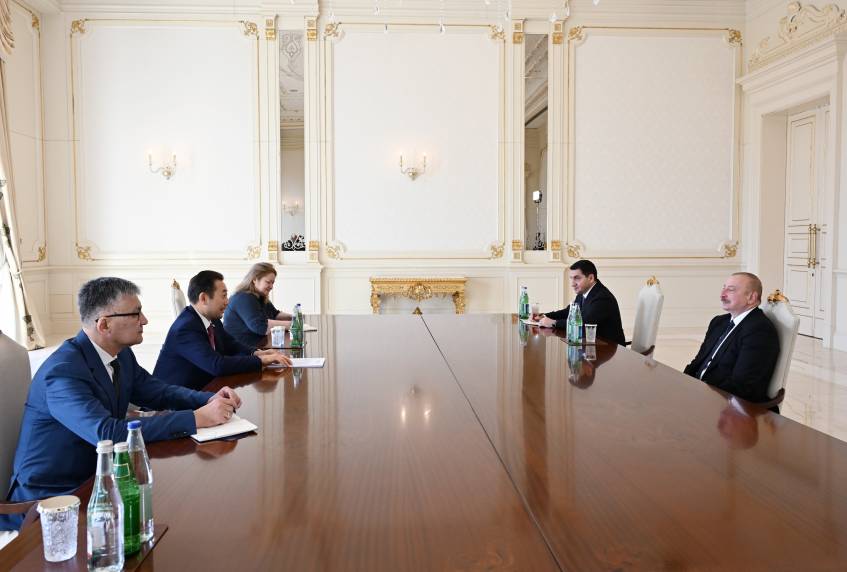
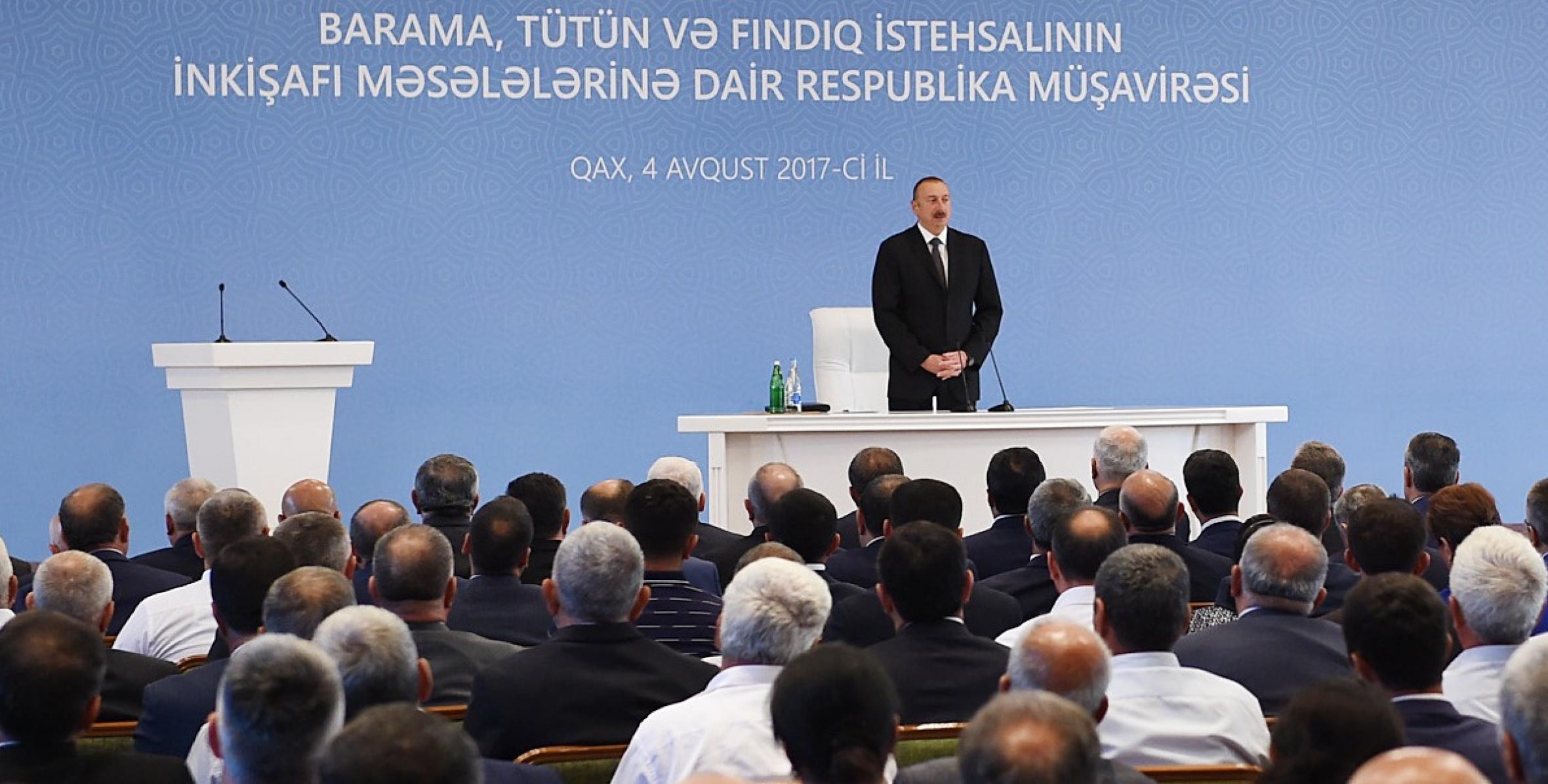
I was on a trip to Balakan, Zagatala and Gakh districts yesterday. I got acquainted with the work carried out in the districts, gave additional instructions and I can see again that these districts have been experiencing very rapid development in recent years. I attended the opening of many social, infrastructure, energy, transportation and agricultural facilities, processing industry facilities. All of the events held yesterday once again visually demonstrate the work done in recent years in this region and, in general, in Azerbaijan.
Rapid development is observed not only in these three districts, but also in the entire north-western region. Major investments are being made in this region both by the state and the private sector. Of course, most of the investment here is made by the state. In recent years, very large investment has been made in the region from the state budget: for the construction of roads, power stations, gasification, water supply, irrigation, social facilities. Schools, hospitals, social facilities, sports centers, tourist facilities – in short, the north-western region of our country today is experiencing a period of rapid development, and the prospects are very positive. I am sure that as a result of the execution of these instructions in the coming years, this positive momentum will get even stronger.
Today's meeting is devoted to the development of traditional agricultural sectors for this region. Tobacco growing, silkworm breeding, hazelnut farming have developed in this region for centuries. These spheres have great traditions in our country. The land conditions, the soil fertility, the climate, the geographical location, our proximity to external markets and position on the ancient Silk Road – all this has given an impetus to the development of these sectors. The Azerbaijani people have worked on these areas for centuries and achieved good results. Looking at statistics, we can see that the most successful and rapid development of tobacco growing, silkworm breeding and hazelnut farming is associated with the name of great leader Heydar Aliyev. It is thanks to him that these spheres experienced great development in the 1970s and early 1980s. The work done at that time suggests that we can successfully restore them today. In fact, not only these sectors, but also cotton growing, viticulture and other branches of agriculture successfully developed under the leadership of Heydar Aliyev. Today we are rebuilding these traditional spheres.
The goal of today's meeting is to sum up the work done. After all, a lot of work has been done in the past two years to develop these sectors. We also need to prepare a specific plan of actions for the future. State programs will be also adopted, so that these traditional sectors develop even more extensively in Azerbaijan.
After the departure of great leader Heydar Aliyev from Azerbaijan to Moscow, Azerbaijan faced a recession in these sectors and all other spheres. Our economic and industrial potential gradually declined and as a result, on the eve of our independence, the country's economy and industry could was in a very difficult situation. In the first years of our independence, the anti-national forces, the tandem of the PFPA and Musavat, essentially led our country to a disaster. Because of the political crisis, military crisis, civil war, occupation of our lands, as well as their incompetence and ignorance, the traditional branches of agriculture declined. So did industrial production. Inflation was at 1,000 per cent at the time, and the country's prospects were rather bleak. After the return of great leader Heydar Aliyev to power on persistence of the Azerbaijani people, stability started to set in from 1993, all illegal armed groups were disarmed, law and order were restored, chaos, anarchy and arbitrariness ended, and Azerbaijan embarked on a period of stability.
Of course, we did not have major financial opportunities at the time. Azerbaijan was known in the world as a very risky country. Therefore, first of all, our primary goal was to introduce our country to the world and attract investments, and we achieved that. A good example of this is the signing of the Contract of the Century. This historic project ushered an influx of investment to Azerbaijan and played a special role in the life of our country at that time. At the same time, very serious steps were taken in connection with industrial production. In particular, the decisions made on the future of agriculture facilitated the development of agriculture. Peasants and farmers are well aware that, on Heydar Aliyev's instructions, farmers were exempted from all taxes except for the land tax, that land reform was carried out and initial steps were taken on the path leading to development. However, our financial capabilities were very limited at that time, so the state could not provide material support to agriculture at the proper level. However, as a result of a transition to private enterprise and market economy in agriculture, a period of development began.
In 2004, on my initiative, the State Program on Socioeconomic Development of the Regions was adopted. It played a very important role in the history of our country. Just imagine what problems our regions might have faced if this program had not been adopted. It was thanks to the adoption of the first and then second and third programs that the regions came to life, began to develop and major investment was attracted. I believe that the development of Azerbaijani regions from 2004 to the present day is a historic achievement. Never before in the history of Azerbaijan has so much work been done in such a short period of time! Today, all the necessary infrastructure projects have been implemented in the regions of Azerbaijan and we are experiencing a period of rapid development.
At that time, our key goals were to resolve infrastructural issues. Our roads were in terrible condition, we could not provide ourselves with electricity, there was no gas in the regions at all, half of Baku was without gas, and projects related to land reclamation simply remained on paper. We put them into practice, and as a result of the solution of infrastructure problems, Azerbaijan today not only provides itself with electricity, but also exports it in large volumes and earns a lot of money. These opportunities were created by more than 20 new power stations built in Azerbaijan. At present, gasification in Azerbaijan is at the level of 93 per cent, and now we have become a reliable gas supplier country for the world, Europe and neighboring countries. From 2004 to the present day, i.e. until 2017, a total of 11,000 kilometers of new roads have been laid – both highways and rural roads. We have implemented major reclamation projects, the water reservoirs of Takhtakorpu and Shamkirchay have been created, other water bodies and canals have been established, and this process continues. One of the main tasks facing us now is to ensure sustainable provision of water to farmers.
Social infrastructure has been created, more than 3,000 schools, over 600 hospitals were built. There are about 50 Olympic centers in the regions. At the same time, hundreds of thousands of new jobs have been created at the expense of the loans provided to entrepreneurs. In total, from 2004 to date, 1.5 million jobs have been created, most of which are permanent. It is possible to say that there is no such social factor as unemployment in Azerbaijan. It is a factor worrying and suffocating many countries. Unemployment is at the level of 5 per cent. Today, anyone who wants to work can find a job. Considering the fact that tremendous work has been done over the last two years, especially in agriculture and industry, the level of unemployment and poverty in Azerbaijan will decrease even more. We have managed to save our people and country from these great evils.
Since 2004, one of the key tasks related to the implementation of infrastructure projects was food security. We focused our attention on this area. This was a priority. Representatives of the older generation are well aware that in Soviet times Azerbaijan could not provide itself with meat, butter, milk and chicken meat. These products were delivered from other republics. We, in turn, produced cotton, grapes, fruits, vegetables, tobacco, hazelnuts, and supplied them to other republics. However, in the years of independence issues of food security came to the fore. Therefore, we switched out attention to this area. As a result of this, there is great development in grain growing today. We can’t yet be fully satisfied with that because we still can’t provide ourselves fully, but there is development. The production of meat practically meets the needs of Azerbaijan. As a result of the measures to be taken in the years to come, we will gain major export potential. We provide ourselves with chicken meat by 100 per cent, milk and dairy products by about 80 per cent. Large volumes of fruits and vegetables are exported from Azerbaijan. So issues of food security are a priority. I can say that the progress made in this area is very reassuring. In the coming years, the results will be even more significant.
As for technical crops, this sphere was not given sufficient attention. This was due to the fact that investment had to be primarily made in infrastructure and food security. We have other major social programs. In particular, billion have been invested in improving the situation of internally displaced persons. Billion have been invested in army building. Therefore, the development of technical crops was somewhat out of focus. It was believed that the market economy and the private sector would develop these sectors. However, we saw that without state support these sectors can’t develop, and there has been a serious decline there in recent years. We can say that we have already lost these sectors. Cotton growing was practically lost. There was no interest in tobacco growing, while silkworm breeding was completely removed from the agenda. Therefore, as a result of the attention shown to these areas, a turnaround has occurred in a matter of two years. The production of cotton has increased. Whereas in 2015 cotton was sown only on 17,000 hectares, this year the area has reached 136,000 hectares – a 10-time increase in just two years! Production is growing and will continue to grow accordingly. Now we are entering foreign markets with our export opportunities. We will export not only raw cotton and cotton fiber, but also finished products due to the launch of a major light industry enterprise being created in Mingachevir. To other areas, for example, hazelnut farming – hazelnut farming has increased in the years of independence. Unlike tobacco growing and sericulture, farmers have been showing interest in this sphere. There was growth, albeit rather small. However, we have accelerated this growth. In a matter of two years, 18,000 hectares of new hazelnut gardens have been established. They will yield in a few years.
The first steps taken in connection with tobacco growing are yielding results. After this meeting, a very serious program will be adopted. Sericulture has gained momentum in Azerbaijan. I think that farmers and peasants are showing particular interest in silkworm breeding. The state has taken on everything, gives all the necessary material and seedlings, and provides subsidies on all areas. Silkworm breeders get a good income in 30-40 days. Therefore, additional measures will be taken to develop this traditional sector. Today we will talk about this.
As for the prospects for overall economic development, I rate them quite highly. The economy of Azerbaijan is developing. The results of six months of this year suggest that. Our non-oil economy, the non-oil industry has increased. Exports have increased by 36 per cent, non-oil exports by 27 per cent. Agricultural exports have increased by more than 40 per cent. In six months, we have not only preserved foreign exchange reserves, but received an additional $3 billion dollars in currency as a result of the measures taken and sound economic policies. In the first six months, investments in Azerbaijan amounted to $5 billion. It is no coincidence that the Davos World Economic Forum placed our economy in 37th place globally in terms of competitiveness. This is the first indicator in the CIS. It is a manifestation of the work done. There is macroeconomic stability. The rate of the manat is stable. Public investment is made. The private sector has also joined this. About 40 agro-parks are being set up. In the next one to two years, the produce of these agro-parks will be exported to large markets, thereby ensuring domestic food security.
In short, Azerbaijan successfully addresses issues of reducing dependence on imports, meeting domestic demand through domestic production and expanding export opportunities. I am sure that as a result of today's meeting, our traditional spheres such as silkworm breeding, tobacco growing and hazelnut farming will successfully develop, farmers and peasants will get more benefits, and our state will become even stronger.

Aleksandar Vučić, President of the Republic of Serbia, made a phone call to the President of the Republic of Azerbaijan Ilham Aliyev, on April 16, briefing him on the pressures Serbia has been encountering recently and requesting the support of the friendly...
16 April 2024, 20:36Dear Mr. Pellegrini,
I sincerely congratulate you on your election as the President of the Slovak Republic.
The development of friendly relations with Slovakia holds great significance for us. Currently, there are good opportunities for enriching the...
15 April 2024, 13:06Prime Minister Muhammad Shehbaz Sharif of the Islamic Republic of Pakistan made a phone call to President Ilham Aliyev of the Republic of Azerbaijan on April 9.
Pakistan's Prime Minister congratulated the head of state on the occasion of Eid al-Fitr and wished...
09 April 2024, 19:52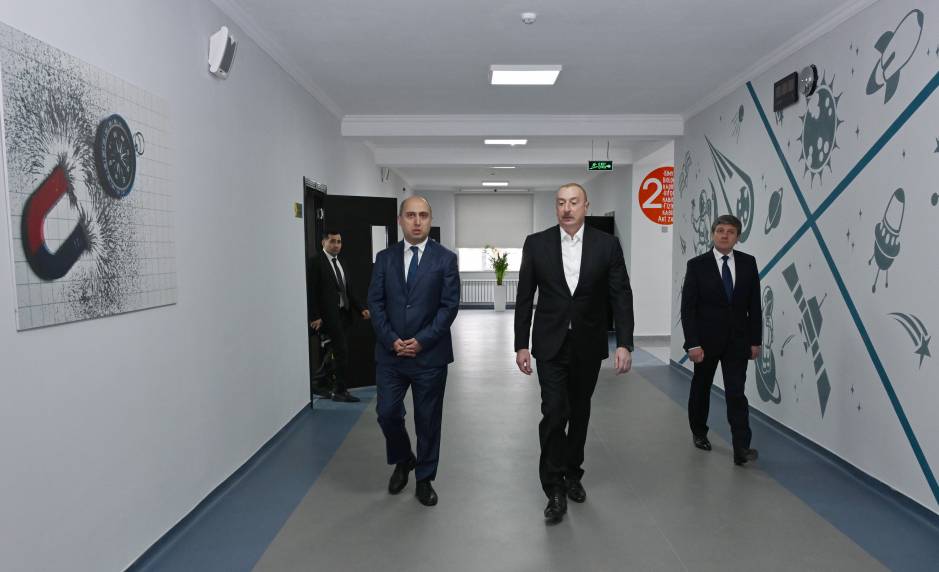
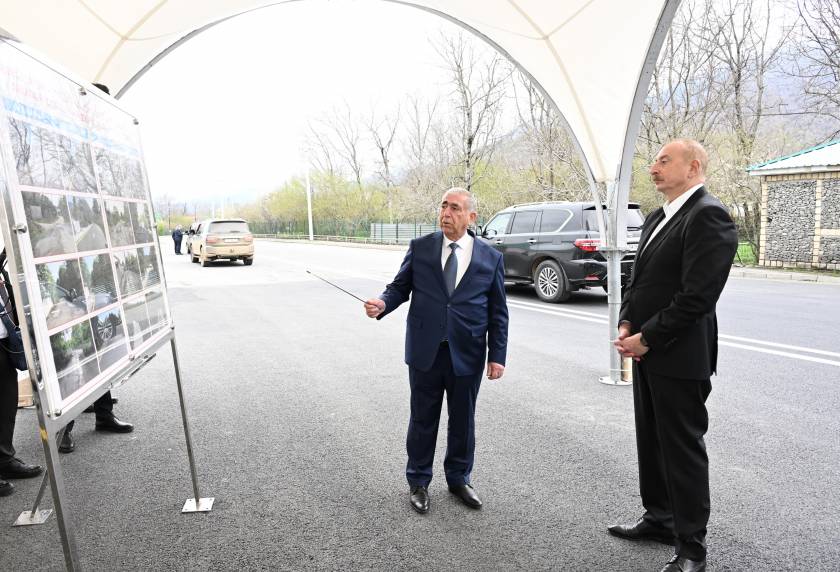
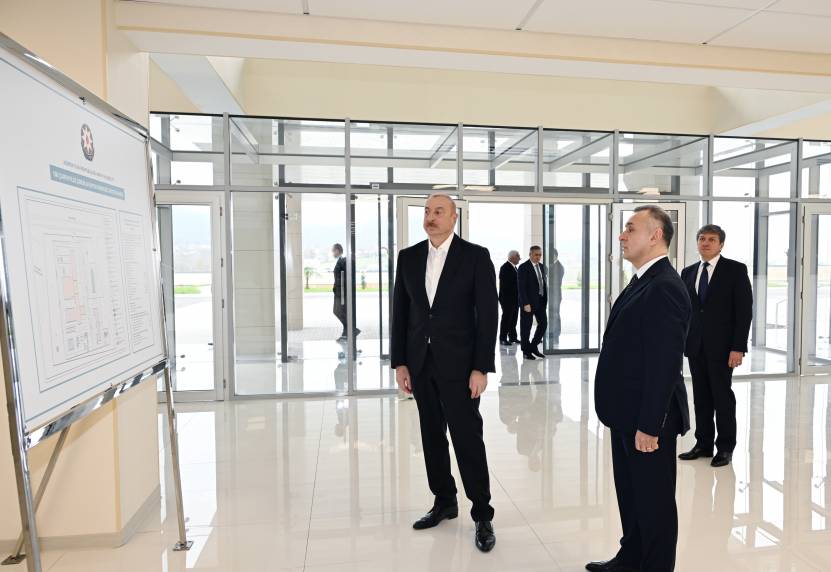
On April 9, President Recep Tayyip Erdogan of the Republic of Türkiye made a phone call to President Ilham Aliyev of the Republic of Azerbaijan.
The President of Türkiye congratulated President Ilham Aliyev on the occasion of Eid al-Fitr and wished the people of...
09 April 2024, 15:39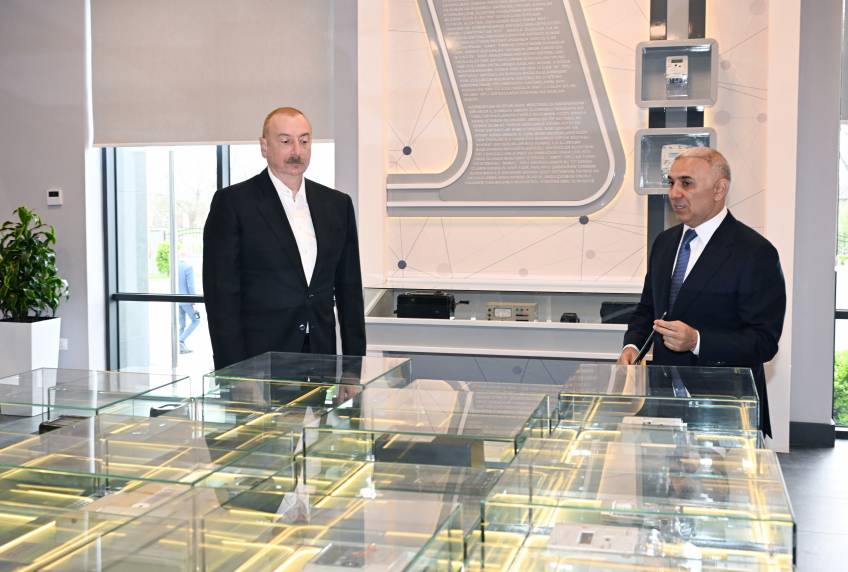
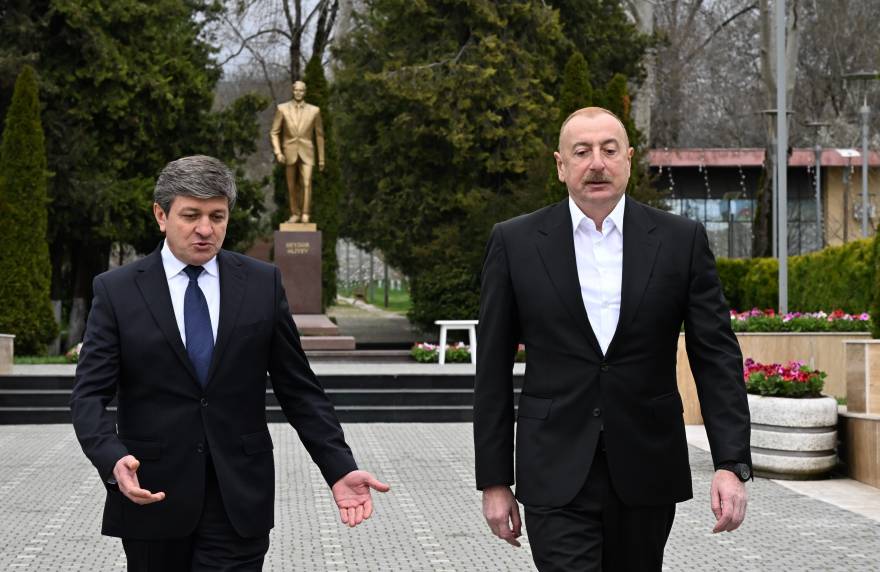
President of the Republic of Azerbaijan Ilham Aliyev has toured the Qabala district.
The head of state visited the monument to National Leader Heydar Aliyev erected in the city of Qabala and participated in the opening ceremonies of the 110/35/10 kV "Hajialili"...
09 April 2024, 15:14